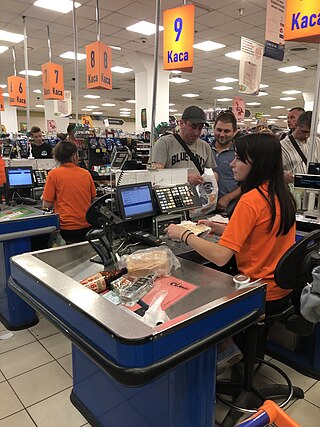
A kayak is a small, narrow human-powered watercraft typically propelled by means of a long, double-bladed paddle. The word kayak originates from the Greenlandic word qajaq.

Kayaking is the use of a kayak for moving over water. It is distinguished from canoeing by the sitting position of the paddler and the number of blades on the paddle. A kayak is a low-to-the-water, canoe-like boat in which the paddler sits facing forward, legs in front, using a double-bladed paddle to pull front-to-back on one side and then the other in rotation. Most kayaks have closed decks, although sit-on-top and inflatable kayaks are growing in popularity as well.

A sex position is a position of the body that people use for sexual intercourse or other sexual activities. Sexual acts are generally described by the positions the participants adopt in order to perform those acts. Though sexual intercourse generally involves penetration of the body of one person by another, sex positions commonly involve penetrative or non-penetrative sexual activities.

In publishing and graphic design, Lorem ipsum is a placeholder text commonly used to demonstrate the visual form of a document or a typeface without relying on meaningful content. Lorem ipsum may be used as a placeholder before the final copy is available. It is also used to temporarily replace text in a process called greeking, which allows designers to consider the form of a webpage or publication, without the meaning of the text influencing the design.

The Peerage Act 1963 is an Act of the Parliament of the United Kingdom that permits women peeresses and all Scottish hereditary peers to sit in the House of Lords and allows newly inherited hereditary peerages to be disclaimed.
A crossbencher is a minor party member of some legislatures, such as the British House of Lords and the Parliament of Australia. They take their name from the crossbenches, between and perpendicular to the government and opposition benches, where crossbenchers sit in the chamber.
The Peerage of Scotland is one of the five divisions of peerages in the United Kingdom and for those peers created by the King of Scots before 1707. Following that year's Treaty of Union, the Kingdom of Scots and the Kingdom of England were combined under the name of Great Britain, and a new Peerage of Great Britain was introduced in which subsequent titles were created.

The United States Court of Appeals for the First Circuit is a federal court with appellate jurisdiction over the district courts in the following districts:

A sit-in or sit-down is a form of direct action that involves one or more people occupying an area for a protest, often to promote political, social, or economic change. The protestors gather conspicuously in a space or building, refusing to move unless their demands are met. The often clearly visible demonstrations are intended to spread awareness among the public, or disrupt the goings-on of the protested organisation. Lunch counter sit-ins were a nonviolent form of protest used to oppose segregation during the civil rights movement, and often provoked heckling and violence from those opposed to their message.

The sit-up is an abdominal endurance training exercise to strengthen, tighten and tone the abdominal muscles. It is similar to a crunch, but sit-ups have a fuller range of motion and condition additional muscles.

The Greensboro sit-ins were a series of nonviolent protests in February to July 1960, primarily in the Woolworth store—now the International Civil Rights Center and Museum—in Greensboro, North Carolina, which led to the F. W. Woolworth Company department store chain removing its policy of racial segregation in the Southern United States. While not the first sit-in of the civil rights movement, the Greensboro sit-ins were an instrumental action, and also the best-known sit-ins of the civil rights movement. They are considered a catalyst to the subsequent sit-in movement, in which 70,000 people participated. This sit-in was a contributing factor in the formation of the Student Nonviolent Coordinating Committee (SNCC).

The Nashville sit-ins, which lasted from February 13 to May 10, 1960, were part of a protest to end racial segregation at lunch counters in downtown Nashville, Tennessee. The sit-in campaign, coordinated by the Nashville Student Movement and the Nashville Christian Leadership Council, was notable for its early success and its emphasis on disciplined nonviolence. It was part of a broader sit-in movement that spread across the southern United States in the wake of the Greensboro sit-ins in North Carolina.
The Ambai language is an Austronesian language spoken in Indonesian New Guinea, mostly on the Ambai Islands as well as the southern part of Yapen Island. The number of speakers is estimated to be 10,000. Dialects are Randawaya, Ambai (Wadapi-Laut), and Manawi.

BBC Radio 2 is a British national radio station owned and operated by the BBC. It is the most popular station in the United Kingdom with over 14 million weekly listeners. Since launching in 1967, the station broadcasts a wide range of content. The 'About Radio 2' BBC webpage says: "With a repertoire covering more than 40 years, Radio 2 plays the widest selection of music on the radio—from classic and mainstream pop to a specialist portfolio including classical, country, folk, jazz, soul, rock 'n' roll, gospel and blues."
The Royal Ice Cream sit-in was a nonviolent protest in Durham, North Carolina, that led to a court case on the legality of segregated facilities. The demonstration took place on June 23, 1957 when a group of African American protesters, led by Reverend Douglas E. Moore, entered the Royal Ice Cream Parlor and sat in the section reserved for white patrons. When asked to move, the protesters refused and were arrested for trespassing. The case was appealed unsuccessfully to the County and State Superior Courts.

The sit-in movement, sit-in campaign or student sit-in movement, were a wave of sit-ins that followed the Greensboro sit-ins on February 1, 1960 in North Carolina. The sit-in movement employed the tactic of nonviolent direct action and was a pivotal event during the Civil Rights Movement.
The Katz Drug Store sit-in was one of the first sit-ins during the civil rights movement, occurring between August 19 and August 21, 1958, in Oklahoma City, Oklahoma. In protest of racial discrimination, black schoolchildren sat at a lunch counter with their teacher demanding food, refusing to leave until they were served. They sought to end the racial segregation of eating places in their city, sparking a sit-in movement in Oklahoma City that lasted for years.
The Atlanta sit-ins were a series of sit-ins that took place in Atlanta, Georgia, United States. Occurring during the sit-in movement of the larger civil rights movement, the sit-ins were organized by the Committee on Appeal for Human Rights, which consisted of students from the Atlanta University Center. The sit-ins were inspired by the Greensboro sit-ins, which had started a month earlier in Greensboro, North Carolina with the goal of desegregating the lunch counters in the city. The Atlanta protests lasted for almost a year before an agreement was made to desegregate the lunch counters in the city.

The right to sit refers to laws or policies granting workers the right to be granted suitable seating at the workplace. Jurisdictions that have enshrined "right to sit" laws or policies include Mexico, France, Spain, Argentina, the United Kingdom, Jamaica, South Africa, Eswatini, Cameroon, Tanzania, Uganda, Lesotho, Malaysia, Brazil, Israel, Ireland, Zambia, Guyana, the Indian states of Tamil Nadu and Kerala, the Canadian province of Newfoundland and Labrador, and the British overseas territory of Gibraltar and Montserrat. Almost all states of the United States and Australia, as well as the majority of Canadian provinces passed right to sit legislation for women workers between 1881 and 1917. US states with current right to sit legislation include California, Florida, Massachusetts, Montana, New Jersey, New York, Oregon, Pennsylvania, West Virginia, and Wisconsin. A right to sit provision is included in the International Labour Organization's Hygiene Convention, 1964; the international treaty being ratified by 52 countries as of 2023. EU-OSHA recommends suitable seating as a best practice. Local jurisdictions with right to sit laws include Portland, Oregon, St. Louis, Missouri, and London's Royal Borough of Kensington and Chelsea.












